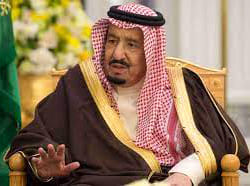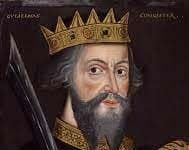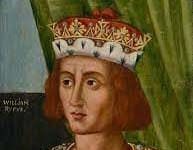King Salman bin Abdulaziz | Brief Biography
King Salman bin Abdulaziz
King Salman bin Abdulaziz
King Salman bin Abdulaziz Al Saud was born on December 31, 1935, in Riyadh, Saudi Arabia. He is the 25th son of King Abdulaziz, the founder of modern Saudi Arabia. King Salman was the governor of Riyadh Province from 1955 to 1960, and then the governor of Riyadh Province again from 1963 to 2011. He served as the deputy governor from 2011 to 2012.
King Salman was declared Crown Prince in 2012, following the death of his brother, Crown Prince Nayef bin Abdulaziz Al Saud. On January 23, 2015, he became the King of Saudi Arabia following the death of King Abdullah.
King Salman bin Abdul Aziz‘s reign has been marked by a number of significant events, including the Saudi-led intervention in Yemen, the blockade of Qatar, the implementation of reforms aimed at reducing the country’s dependence on oil, and the establishment of the “Vision 2030” plan. The vision aims to diversify the Saudi economy and reduce the country’s dependence on oil exports.
King Salman has also launched several major construction projects, including the construction of a new city called NEOM, which is planned to be a hub for innovation and technology. He has also approved the construction of the King Salman Complex for Maritime Industries and Services, which is expected to be one of the largest maritime facilities in the world.
The King has also made efforts to modernize the country’s social and cultural norms, including lifting the ban on women driving and allowing women to attend public sporting events. He has also implemented a series of reforms aimed at improving the country’s human rights record, such as reducing the use of the death penalty and increasing the rights of workers.
King Salman has made several visits abroad, including to the United States, Russia, China, and several European countries. He has also hosted several world leaders, including President Putin of Russia and President Xi Jinping of China. 0 0 0.
King Salman bin Abdulaziz Al Saud: Comprehensive Biography
Early Life and Education
King Salman bin Abdulaziz Al Saud, the Custodian of the Two Holy Mosques, was born on December 31, 1935 in Riyadh, Saudi Arabia. He is the 25th son of King Abdulaziz, the founder of Saudi Arabia. From a young age, Salman was immersed in Islamic studies and education. He studied at the Prince’s School in Riyadh, which was established specifically for the education of members of the royal family, and focused on Islamic teachings and modern education.
Family and Personal Life
King Salman has married several times and has several children. His most prominent son is Crown Prince Mohammed bin Salman (MBS), who has gained global recognition for his role in the modernization of Saudi Arabia. Known for his commitment to family and tradition, King Salman has played a key role in maintaining the unity of the Saudi royal family.
Political career
King Salman began his public service career at an early age.
Governor of Riyadh (1955-1960; 1963-2011): At the age of 19, King Salman became the governor of Riyadh Province. Under his leadership, Riyadh was transformed from a medium-sized desert city to a thriving metropolitan city, becoming the economic and cultural center of Saudi Arabia. His rule emphasized urban development, infrastructure, and economic growth.
Defense Minister (2011-2015): After serving as governor for nearly five decades, Salman was appointed Defense Minister in 2011. During his tenure, he modernized the Saudi military, strengthened defense capabilities, and played a key role in addressing regional security issues.
Crown Prince (2012-2015): Following the death of Crown Prince Nayef bin Abdulaziz, King Salman was named Crown Prince in 2012. In this role, he continued to oversee defense affairs and prepare for his eventual ascension to the throne.
Ascension to the Throne (2015): On January 23, 2015, King Salman became the seventh king of Saudi Arabia after the death of his half-brother, King Abdullah. Significant reforms and challenges marked his reign.
Reform and Visionary Leadership
A blend of tradition and modernization has characterized King Salman’s leadership.
Vision 2030
One of the most notable initiatives during King Salman’s reign is Vision 2030, which is led by Crown Prince Mohammed bin Salman. This ambitious plan aims to diversify Saudi Arabia’s economy, reduce dependence on oil and boost sectors such as tourism, technology and renewable energy.
Social Reforms
- Expanded women’s rights, including allowing women to drive and participate more actively in the workforce.
- Promoted cultural and entertainment initiatives, including reopening theaters and hosting international events.
Economic Policies
- Launched large-scale investments in infrastructure, technology and sustainable development projects.
- Established the Public Investment Fund (PIF) as a central tool for economic transformation.
Foreign Policy
King Salman has placed a strong focus on regional stability.
- Supported military intervention in Yemen to combat Houthi rebels.
- Strengthened alliances with the United States, the United Kingdom and other Western countries while building ties with emerging powers such as China and Russia.
Legacy and Achievements
Modernization of Saudi Arabia: King Salman’s reign saw unprecedented economic and social changes.
Global Influence: He has played a key role in shaping Saudi Arabia’s international relations.
Custodian of the Two Holy Mosques: King Salman has retained his responsibility to safeguard Islam’s holiest sites and promote interfaith dialogue.
Health and Personal Interests
King Salman has faced health challenges, including spinal problems, but he continues to perform his duties. He is known for his passion for reading, history, and poetry, reflecting his deep appreciation for Arab culture and heritage.
The reign of King Salman bin Abdulaziz Al Saud is a testament to striking a balance between tradition and modernization. His leadership has not only transformed Saudi Arabia into a more dynamic and open society, but also established it as an important player on the global stage. His legacy will likely be best remembered for its reforms, economic diversification, and efforts to promote a modern Saudi identity while preserving Islamic values. 0 0 0
Data in Brief: King Salman bin Abdulaziz Al Saud
| Aspect | Details |
|---|---|
| Full Name | Salman bin Abdulaziz Al Saud |
| Date of Birth | December 31, 1935 |
| Place of Birth | Riyadh, Saudi Arabia |
| Family | 25th son of King Abdulaziz; father to Crown Prince Mohammed bin Salman (MBS) |
| Education | Studied at Prince’s School in Riyadh with a focus on Islamic and modern studies |
| Key Roles | – Governor of Riyadh (1955–1960; 1963–2011) |
| – Minister of Defense (2011–2015) | |
| – Crown Prince (2012–2015) | |
| – King of Saudi Arabia (2015–Present) | |
| Major Achievements | – Transformed Riyadh into a modern metropolis |
| – Spearheaded Vision 2030 for economic diversification | |
| – Expanded women’s rights and introduced cultural reforms | |
| Social Reforms | – Allowed women to drive and increased their workforce participation |
| – Reopened cinemas and promoted entertainment initiatives | |
| Economic Reforms | – Strengthened Public Investment Fund (PIF) |
| – Focused on tourism, technology, and renewable energy | |
| Foreign Policy | – Led military intervention in Yemen |
| – Strengthened ties with the U.S., U.K., and emerging powers like China and Russia | |
| Legacy | – Modernized Saudi Arabia while preserving Islamic traditions |
| Health | Faces spinal and health challenges but remains active in governance |
| Interests | Reading, history, and poetry reflecting Arab culture |
| Reign Highlights | Economic transformation, cultural openness, and global influence |
Frequently Asked Questions: King Salman bin Abdulaziz Al Saud
1. Who is King Salman bin Abdulaziz?
King Salman bin Abdulaziz is the King of Saudi Arabia, serving as the Custodian of the Two Holy Mosques since 2015. He is known for his leadership in modernizing Saudi Arabia and spearheading reforms under Vision 2030.
2. When and where was King Salman born?
King Salman was born on December 31, 1935 in Riyadh, Saudi Arabia.
3. What is King Salman’s educational background?
King Salman was educated at the Prince School in Riyadh, where he focused on Islamic studies and modern education.
4. What were King Salman’s major roles before becoming king?
- Governor of Riyadh: (1955–1960; 1963–2011)
- Defense Minister: (2011–2015)
- Crown Prince: (2012–2015)
5. What is Vision 2030?
Vision 2030 is a strategic plan launched during King Salman’s reign to diversify Saudi Arabia’s economy, reduce its dependence on oil and promote sectors such as tourism, technology, and renewable energy.
6. What are some of the important reforms initiated under King Salman’s leadership?
- Empowering women, including allowing them to drive and participate in the workforce.
- Reopening cinemas and promoting cultural and entertainment events.
- Expanding economic opportunities through investment and diversification.
7. Who is King Salman’s most prominent child?
Crown Prince Mohammed bin Salman (MBS) is known for his leadership role in implementing Vision 2030 and modernizing Saudi Arabia.
8. How did King Salman transform Riyadh as governor?
As governor of Riyadh, King Salman oversaw the city’s development and turned it into a modern metropolis, with advanced infrastructure, cultural centers, and economic growth.
9. What are King Salman’s contributions to foreign policy?
King Salman has strengthened alliances with the US, UK, and other countries while addressing regional security issues, including military intervention in Yemen.
10. What is King Salman’s legacy?
King Salman’s legacy includes modernizing Saudi Arabia, initiating economic and social reforms, and maintaining Saudi Arabia’s cultural and religious values.
11. What are King Salman’s personal interests?
He is fond of reading, history, and poetry, reflecting his deep appreciation for Arab culture.
12. How has King Salman addressed health challenges?
Despite facing spinal and other health problems, King Salman continues to actively lead Saudi Arabia, focusing on governance and reform.
13. What is King Salman’s role as Custodian of the Two Holy Mosques?
As Custodian of the Two Holy Mosques, King Salman is responsible for overseeing the management and development of Islam’s holiest sites in Mecca and Medina.
14. How has King Salman influenced global perceptions of Saudi Arabia?
Through reforms and modernization, King Salman has enhanced Saudi Arabia’s global image as a progressive and influential nation.
15. What economic reforms has King Salman implemented?
King Salman has focused on diversifying the economy, strengthening the Public Investment Fund (PIF), and encouraging investment in renewable energy and tourism. 0 0 0
N.B. The article ‘King Salman bin Abdulaziz’ originally belongs to the book ‘Brief Biographies of Eminent Monarchs‘ by Menonim Menonimus.
Books of Biography by M. Menonimus:
- The World Writers-Brief Biographies
- Introduction to World Writers
- Introduction to World Personalities
- Love of Reputed Persons
- Brief Biographies of Ancient Thinkers and Writers..
Additional Searches:
- Famous Kings and Queens
- Living Biographies of Famous Rulers
- Biography of Elizabeth II
- Most Famous Kings in History











